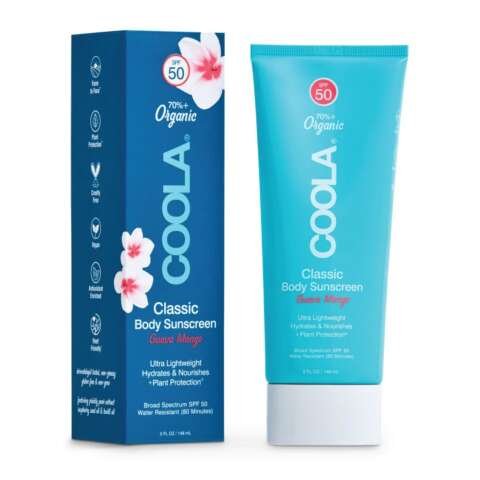Enjoy the beach while protecting coral reefs, dolphins, fish, and our oceans with these simple eco-friendly tips.
| All products featured on The Wellness Feed are independently selected by our editors for their environmental and ethical impact. However, we may earn an affiliate commission when you buy something through our retail links. |
The sun is soothingly warm, the waves are inviting, and many of us are packing our bags to head to the beach (if we aren’t already there). Yet, as pleasurable as these trips are, the environmental impact from our days lounging in the sun isn’t so nice. From the trash, we forgetfully leave behind to the sunscreens we lather onto our skin, our presence on the beach can affect the health of coastlines, oceans, and wildlife. But, there are small changes we can make to help to protect and preserve the environment. So, if you’re heading to the beach here are a few tips you can take to be an eco-friendly beachgoer.

Wear Reef-Safe Sunscreens
The majority of sunscreens contain oxybenzone or octinoxate, chemicals that can seep into the water and bleach coral reefs. This can lead to viruses thriving in coral reefs and putting them at risk of death. These chemicals are also linked to reproductive damage in fish and have been found in the tissue of young dolphins. Every year, 6,000 tons of sunscreen are washed into the oceans, causing potential harm to this delicate ecosystem.
Reef-safe sunscreens protect the skin without these harmful chemicals. Instead, they rely on zinc and titanium oxide- two minerals- that sit on top of the skin and aren’t linked to coral bleaching or harming marine life. Next time you’re shopping for sunscreen, read the ingredient list to double-check that you’re protecting your skin and the oceans.

Carry a Reusable Water Bottle
Did you know that billions of pounds of plastic are in our oceans? A lot of it is single-use plastic water bottles. An estimated 1,000,000 plastic water bottles are purchased per minute, with 91% ending up in landfills or leeching into our oceans. Some research estimates that we’re only a few years away before plastic pollution outnumbers fish in the ocean. With issues like microplastics – tiny pieces of plastic that break off from items like water bottles- polluting our oceans and drinking water, finding solutions to stop plastic waste is paramount to our health.
Carrying a reusable water bottle is one of the easiest eco-friendly tips to follow to reduce plastic pollution. Even when plastic water bottles are purchased with the good intention of being recycled or thrown out, sometimes cans can overflow and waste can blow into the ocean before it can be properly collected. By carrying a water bottle with you to the beach you will ensure that you’re taking your trash with you and not threatening the oceans with plastic waste.

Say ‘No’ To Plastic
As previously mentioned, we’re in a plastic crisis and a lot of it ends up along our coastlines and in our oceans.
While carrying a reusable water bottle is a great tip, ditching plastic altogether is even better when you’re at the beach. Pack your food at home the night before in a beach tote. If you’re buying food on the boardwalk bring a reusable bag with you to avoid using a plastic bag. Invest in other reusable plastic-free items like a set of flatware or straws that you can carry with you on the go to contribute to a plastic-free beach.

Don’t Leave Anything Behind
Whenever you’re taking a trip to nature it’s always best to avoid leaving anything behind. Much like hikes that ask for nature lovers to take wrappers and food items with them, it’s best to pack up and throw out your trash at home instead of relying on cans at the beach. Even beaches that provide trash cans might not be collected nightly. That means that cans can overflow allowing pieces to be picked up by the wind and swept into oceans. Waiting to properly dispose of your trash at your home is a small eco-friendly step you can take to protect our waterways.

Join a Beach Clean Up
When planning your next beach holiday, check to see if there is a cleanup happening that you can join. A lot of times these crews will provide everything you need- hand sanitizer, grabbers, trash bags, etc.- to help clean up the coastlines. Most likely they also allow you to be flexible with your time. If you only donate an hour or two, you’ll still have plenty of time to enjoy the sun and a nice long beach day.
Here are a few organizations to check out:
Surfrider: If you’re around the Great Lakes, Puerto Rico, or Hawaii, you might catch these volunteers cleaning up litter from beaches and coastlines. Since 2017, they’ve removed 961,000+ pounds of trash and recycling.
Ocean Conservatory: For 30 years this organization has been hosting cleanups and advocating for the health of our oceans. With locations throughout the U.S, Africa, parts of Europe and Indonesia there are multiple locations for you to show up and volunteer.
Ocean Blue: Founded in 2012 by tribal members of the Choctaw Nation of Oklahoma, this nonprofit is focused on removing 1 million pounds of plastic debris from our oceans by 2025.

Don’t Collect Shells
The last of these eco-friendly tips might be a little hard if you’re used to walking home from the beach with seashells as a child. But, in order to protect the oceans and its surrounding wildlife, it’s best to leave the seashells behind. Shells provide homes and hiding places for animals from predators and materials for birds to build their nests. They’re also essential to for algae and seagrass who use them as an anchor.
So, while they might seem fun and pretty to collect and take home, know that they are part of a delicate balance for ocean life to thrive.
